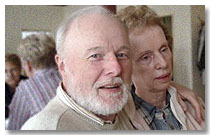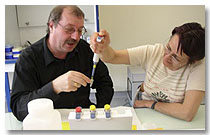Huntington disease
November 2011The onset of a rare disease brings huge changes in its wake, not only for the person diagnosed but also for their family. Denis Ryan and Roger Picard, two men leading different lives, share a common bond in the Huntington disease (HD) that has affected both their wives.
 Denis Ryan lives in Ireland with his wife, Anne, who was diagnosed with Huntington’s in 1996. Anne’s younger sister had already been diagnosed and her older sister was also showing symptoms. Denis had suspected for some time that his wife had HD but knowing for sure, he explained, “is a life-changing moment. You realise that things will never be the same again.”
Denis Ryan lives in Ireland with his wife, Anne, who was diagnosed with Huntington’s in 1996. Anne’s younger sister had already been diagnosed and her older sister was also showing symptoms. Denis had suspected for some time that his wife had HD but knowing for sure, he explained, “is a life-changing moment. You realise that things will never be the same again.”
Before HD, life was fairly normal. Anne looked after the children and Denis worked as an engineer.
“While the children were growing up life goes by in a bit of a ‘blur’. When they have left home the parents often wonder ‘what now’? Well HD certainly answered that question…” says Denis.
Huntington disease is a genetic disorder causing degeneration in parts of the brain, leading to physical, mental and emotional changes varying greatly from person to person but including anxiety, irritability, paranoia, psychosis, dementia, mobility, speaking and swallowing difficulties. Occurrence is estimated at 1/10,000-1/20,000.
Denis and Anne took advantage of the slow development of the condition to do some of the things they’d planned, like travelling.
“These things are not possible now but she still ‘boasts’ about seeing the Grand Canyon on our 40th wedding anniversary!” says Denis. “Although Anne is quite disadvantaged now, we try not to let it get in the way of enjoying our lives as much as possible.”
The difference is that Denis has to make all the decisions alone. “While Anne became a different person, because of the effects of HD, I also had to learn to become a different person. This loss of your partner is one of the big changes.”
 Roger Picard’s wife was diagnosed with HD in 1993 and, like Anne, she had been showing symptoms for some time before. After 20 years of family life together in France everything changed dramatically. Between 1992 and 1994 Denise made nine suicide attempts, the last involved setting fire to their home.
Roger Picard’s wife was diagnosed with HD in 1993 and, like Anne, she had been showing symptoms for some time before. After 20 years of family life together in France everything changed dramatically. Between 1992 and 1994 Denise made nine suicide attempts, the last involved setting fire to their home.
“The disease and the burning of the house completely changed this quiet life. I had to take care of everything. It became impossible for me to continue my work so I filed for bankruptcy.”
Both men have had to learn to become carers, with all the complications of managing everyday life, organizing medical care, finding external support for their wives and for themselves. There is no uniformity of care across Europe and, as Denis explains, in Ireland alone, “Services provided seem to differ from area to area, it is not possible to get a ‘check list’ of all the people you need to talk with. Also, service providers differ in the amount of interest they show.”
Denis turned to the Huntington’s Disease Association of Ireland (HDAI), of which he is now chairperson. “Through the pooled resources of the members we learned how others dealt with particular problems and what services they had obtained.”
Roger feels they were fortunate in that Denise was referred to the Neurology Department of Creteil hospital that, in 2004, became the Reference Centre for Huntington disease. However, problems relating to the social care/support of patients exist. “Once diagnosed, they are left to themselves with all the consequences of the disease. As a carer we are not recognised or considered. If I do not do everything myself there is nothing.”
For this reason Roger set up the Fondation Denise Picard, of which he is president. Its primary aim is to set up and manage facilities for neuro-degenerative diseases.
Both men stress the importance of taking care of themselves in order to take care of their wives but it isn’t always easy to get the respite they need. Their biggest fear, however, is for their children, HD is an inherited condition and your chances of getting the disease if one of your parents has it are 50/50.
As Denis says, “probably the worst aspect of all is the knowledge that your offspring are fast approaching the age when symptoms are expected to appear.”
“Living with someone with HD can be a living nightmare. It is not easy to see the person you knew and loved become a person that you no longer know (and may no longer know you!). It is like a long term mourning.”
Nevertheless both Roger and Denis try to focus on the positive aspects of their situation, the surprising kindness of people, the new friends, their work and achievements with HD associations, and both continue to hope that a cure will be found, if not for their wives, then for their children.
This article was first published in the December 2011 issue of the EURORDIS newsletter
Author: Irene Palko
Photo credits: © M. R. Picard, M. D. Ryan
